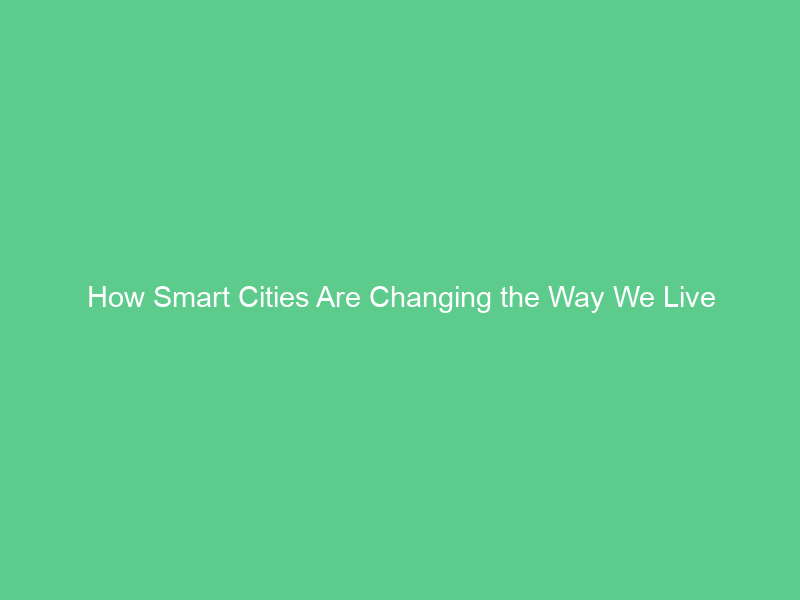Smart cities use technology to monitor and improve infrastructure, providing city services that improve citizens’ lives – such as traffic congestion reduction, waste management, and energy savings.
Denver uses air quality sensors that assist residents in understanding environmental concerns in the city and are also an essential resource for city leaders in making policy decisions.
Infrastructure
As sensors become ubiquitous, elected officials will gain a detailed knowledge of residents’ needs in cities, and collaborate with engaged citizens in designing social and physical interventions that respond dynamically rather than manually, thus cutting costs and energy consumption.
Smart Cities encompass everything from traffic signals and automated parking systems to trash bins that notify when they are full, to face mask detection systems, social distancing features, fever checks and smart tourism – but also solutions designed to improve public safety (face mask detection/social distancing/fever checks/smart tourism etc) or build energy resilience through energy efficiency or renewables. A data-driven approach to urban planning – something Smart Cities provide; in which an interoperable open data platform with citizen feedback channels plays a pivotal role.
Mobility
Cities can use smart city technology to upgrade road infrastructure and ensure traffic flows more seamlessly for citizens, benefitting them by cutting energy costs, monitoring water consumption and preventing pollution.
New technologies are creating smart urban mobility systems to keep up with population growth and shifts in consumer behavior, such as flexible transportation services such as ride-share or car-sharing; autonomous vehicles operating as fleets to navigate smaller spaces more quickly than human drivers; and intelligent parking systems.
Intel’s networking solutions provide the open standards, hardware, and cellular data plans required for these systems to function seamlessly. Intel offers networking solutions designed specifically to connect sensors, kiosks, street lights and traffic cams together across an open network allowing each sensor to seamlessly exchange information with one another.
Health
Smart city movements are having a tremendous impact on healthcare, improving accessibility, efficiency, and quality. Smart cities enable real-time monitoring of health status through wearable fitness trackers and sensors while digital health records allow seamless sharing of patient information.
Smart cities prioritize establishing efficient emergency response systems that can respond quickly to medical emergencies, while simultaneously encouraging healthy lifestyles and sustainable living through community-centric approaches that are transparent and inclusive.
However, it is essential to recognize that smart city technologies evoke complex social responses. JG and SH have stressed the significance of ICT social dimensions for realizing smart cities; thus necessitating ongoing dialogue among technologists and policymakers.
Education
An education designed specifically to meet the needs of smart cities is crucial to its development and maintenance. This should encompass values, skills, and knowledge relevant to its technology infrastructure.
Education in smart cities is enabled by the same technologies that drive their operation – security and energy efficiency among others. Campuses equipped with these systems can use them to install face recognition systems as well as emergency and alert systems to protect students against intruders while improving student safety.
Addressing data privacy concerns remains a significant challenge, making education about how their data is being utilized a must for students. Knowing how their information is used could enable them to make better decisions when choosing universities to attend. In addition, this education could assist with making choices regarding telehealth services or other online service options available to them.
Economy
Smart city technology markets are experiencing significant growth as global economic development and resource management requirements fuel demand for integrated systems. But creating and maintaining these complex technologies requires advanced skills; many IT, engineering and data analytics jobs are necessary to support smart city initiatives.
Smart cities employ technologies to collect and analyze data that improve government services, enhance quality of life for residents, and facilitate business expansion. For example, traffic systems reduce travel times for residents while smart waste management systems automatically optimize routes to minimize fuel consumption and labor costs for trash collection services.
Federal agencies could help accelerate domestic progress on smart-city technologies by offering grants for research and pilot projects related to smart cities. By doing this, more jobs in IT, engineering and data analytics would be created while strengthening local economies.

